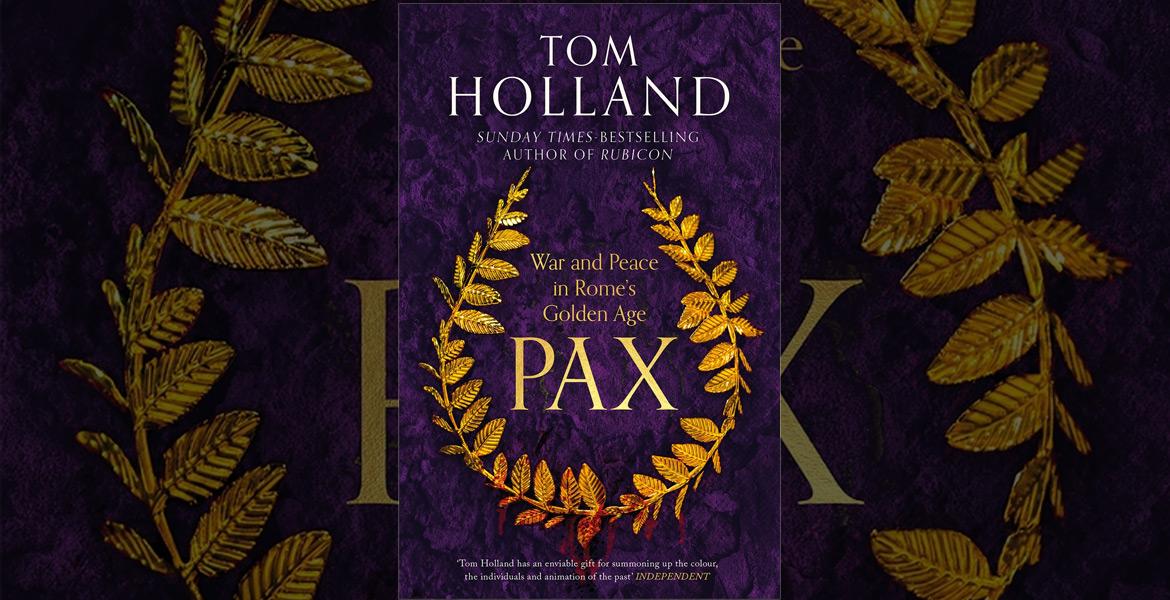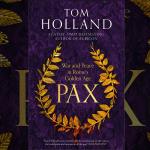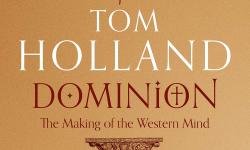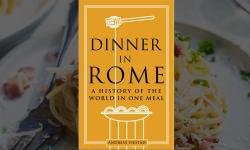Pax, Tom Holland
Tom Holland's latest book, Pax, continues his epic journey through ancient Rome, from the Republic to – one assumes – the eventual decline and fall of the once-mighty empire. This time, it is the turn of Rome's heyday, from the suicide of Nero through to the accessionThe attainment or acquisition of a position of rank or power, often related to the throne. of Antoninus Pius. Within its pages are all the political shenanigans and character portraits that one has come to love and cherish from Holland, mixed with as much social history as the narrativeA story; in the writing of history it usually describes an approach that favours story over analysis. – and sources – will allow. The limits of the book – Nero and Antoninus Pius – might be surprising: any 'golden age' of Rome would surely exclude the former but include all five of the 'good emperors'. Holland, however, is a master storyteller, and a view of the grand narrative across the series could explain much. Perhaps more surprisingly, given its title, are the many conflicts – including the year of the four emperors, but also wars in the provinces and beyond – that are such a significant part of the tale.
Yet as Holland proves beyond doubt, 'The Roman peace was maintained at the point of a sword': without one, the other would not have been possible. Pp. 285-6. While Rome, by and large, enjoyed the fruits of its harvest – 'glory, power, wealth' – it was supported by the backs of the provinces, the conquered territories, the slaves.
Pp. 285-6. While Rome, by and large, enjoyed the fruits of its harvest – 'glory, power, wealth' – it was supported by the backs of the provinces, the conquered territories, the slaves. P. 302. Each suffered for this golden age, with taxes and constraints and lack of liberty. Yet each could also enjoy the benefits. With full marks to Holland for quoting Life of Brian at length, the Pax Romana did provide ‘sanitation, medicine, education, wine, public order, irrigation, roads, fresh water systems and public health’.
P. 302. Each suffered for this golden age, with taxes and constraints and lack of liberty. Yet each could also enjoy the benefits. With full marks to Holland for quoting Life of Brian at length, the Pax Romana did provide ‘sanitation, medicine, education, wine, public order, irrigation, roads, fresh water systems and public health’. P. xix. It wasn’t just safe to walk the streets at night, it was safe to travel the roads and sail the seas, from one end of the empire to the other. What, Holland asks throughout, does it therefore mean to be free? And freedom from what?
P. xix. It wasn’t just safe to walk the streets at night, it was safe to travel the roads and sail the seas, from one end of the empire to the other. What, Holland asks throughout, does it therefore mean to be free? And freedom from what?
Of course, just as the conquered peoples bore some consequences of the Pax Romana, the Roman system, and the city itself, bore others. For a culture based on the virtues of manliness, of simplicity, of dignity, what was to become of it when dangerous habits – of luxury, comfort and, heavens forbid, cookery – were imported along with the hordes of weirdoes and degenerates from the barbarous provinces? What place for the traditions, for the gods, for Romans, in this new empire? When those born far beyond the seven hills were becoming senators, consuls, even emperors, what even constituted a ‘Roman’?
In the endless wake of Brexit, these questions are as relevant still as they were two thousand years ago. Regardless of how much Holland insists in his foreword that the Romans were ‘unnervingly, compellingly different’, Pax makes them seem immediate – almost modern. P. xxviii. Indeed, it would seem that many of the rifts rocking our own world have ancient precedents. Admittedly, the way those issues, which on the surface feel so familiar, were solved is less recognisable. But there can be no doubt that Holland has succeeded in making the ancient world – a world that is suddenly seeming much smaller, where the definitions of ‘foreign’ morph and adapt, where worldviews are constantly clashing, where the rush of ‘development’ takes away from beauty and tradition, where violence and disturbance (or the threat whereof) is the obverse of ‘peace’, and where the same old tired debates over the benefits, or not, of being part of a ‘superpower’ – appear not so very far away.
P. xxviii. Indeed, it would seem that many of the rifts rocking our own world have ancient precedents. Admittedly, the way those issues, which on the surface feel so familiar, were solved is less recognisable. But there can be no doubt that Holland has succeeded in making the ancient world – a world that is suddenly seeming much smaller, where the definitions of ‘foreign’ morph and adapt, where worldviews are constantly clashing, where the rush of ‘development’ takes away from beauty and tradition, where violence and disturbance (or the threat whereof) is the obverse of ‘peace’, and where the same old tired debates over the benefits, or not, of being part of a ‘superpower’ – appear not so very far away.
Holland has undeniably succeeded in his goal of showing ‘the inhabitants of the Roman world the respect due to all ancient peoples: by attempting to understand them not on our terms, but on their own’. P. xxiv. There is, however, a little colouring by his own worldview, and there are contours of Dominion, which considers how Christianity has influenced the West, within. There is no need to be a theologianA person who engages, or is an expert, in theology (the study of faith). to catch the occasional Biblical quotation slipped into the text, and while a point can be made about Pax Romana as an essential precondition for the spread of this new religion, Pax might not be the most appropriate stage for it. This, of course, is entirely dependent on the reader’s own point of view, but for some it’s rather like jumping on a tour bus in Rome, eagerly anticipating a day of spotting all the ancient sites, only to spend the next five hours listening to the tour guide saying, ‘On your right is the basilica de Santa Maria’.
P. xxiv. There is, however, a little colouring by his own worldview, and there are contours of Dominion, which considers how Christianity has influenced the West, within. There is no need to be a theologianA person who engages, or is an expert, in theology (the study of faith). to catch the occasional Biblical quotation slipped into the text, and while a point can be made about Pax Romana as an essential precondition for the spread of this new religion, Pax might not be the most appropriate stage for it. This, of course, is entirely dependent on the reader’s own point of view, but for some it’s rather like jumping on a tour bus in Rome, eagerly anticipating a day of spotting all the ancient sites, only to spend the next five hours listening to the tour guide saying, ‘On your right is the basilica de Santa Maria’.
Thankfully, with Pax we are treated to good views of the Colosseum, the Palatine, and the Pantheon as well. Nor does the tour end there: we spend a dramatic few days in the Bay of Naples, watching in horror along with Pliny the Younger as Vesuvius wipes out countless lives and flattens cities; we visit the northern extremes along the Danube and the Rhine; cross the cold grey sea to meet the strange and barbarous Caledonians; traverse the mountains and plains of Parthia; and sail along the Nile mourning with Hadrian for the loss of his lover. And then there is the written style, both flamboyant and eloquent, that is the hallmark of Holland’s writing. Although there is nothing to rival my favourite quotation – of any history book – ‘that the Athenians were content to ascribe the origins of their city to a discarded toss-rag’, there is still a delightful turn of phrase that brings to life his subjects ‘in all their ambivalence, their complexity and their contradictions’. Tom Holland, Persian Fire (London: Abacus, 2006), p. 101; Pax, p. xxiv. Just as the ‘golden age’ of Rome is a story of assimilation, of peoples coming together under an all-encompassing flag, in Pax Holland has achieved a remarkable synthesis of ideas and themes, of astounding scholarship and beautiful accessibility, to make something that truly stands out from the crowd.
Tom Holland, Persian Fire (London: Abacus, 2006), p. 101; Pax, p. xxiv. Just as the ‘golden age’ of Rome is a story of assimilation, of peoples coming together under an all-encompassing flag, in Pax Holland has achieved a remarkable synthesis of ideas and themes, of astounding scholarship and beautiful accessibility, to make something that truly stands out from the crowd.
- Log in to post comments







